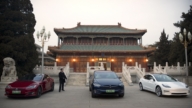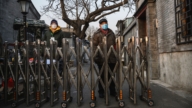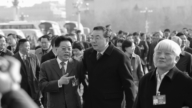【新唐人2013年03月30日訊】大陸國務院新任總理李克強日前要求國務院及各部門,要改革和規範公務接待工作,不得違反規定用公款送禮和宴請、也不得接受地方的送禮和宴請。然而,「上有政策、下有對策」,深諳此道的中共官員們變換手法,照樣吃喝不誤,公款宴請、娛樂、休閒越來越具有私密性。
大陸國務院辦公廳28號對外披露《國務院工作規則》。
新任總理李克強日前在國務院首次全體會議上,要求國務院各部門,禁止公款送禮、宴請。他提出堅決制止奢侈浪費;嚴控差旅會議經費;各類活動經費納入預算管理;到基層調研不去風景區參觀,不搞特權等。
有媒體報導,《國務院工作規則》完全展現了李克強風格,比前任溫家寶更強勢,更具企圖心。但也有報導說:上有政策、下有對策,中國的公款宴請變花樣。
原首都師範大學副教授李元華:「我想從骨子裡他(李克強)想執掌政府,但是拿不出具體措施,所以想擺出一個親民新政的姿態,所以就拿公款吃喝的表面事情來說。所以他說一些話,就當作聽聽而已,根本執行不下去,因為今天中共腐敗已經到根裡邊了,不是說站出一個人說幾句狠話就能解決問題,因為根本就沒有推動力。」
網友(大飛龍)認為,「這些規定本來就有,但這30多年不但沒有制止、杜絕,反而越演越烈,關鍵是實施和監督。」
還有網友(郭程)悲觀的說,「法律規定不許貪污但還是那麼多貪官,在中國講究的是裙帶。家族關係就像織網,單憑你一個新領導走馬上任,妄想能管治好平時貪污吃喝嫖賭的五毒官員,說不定你下臺了貪官還沒倒下。」
香港《明報》引述美國《商業觀察》的文章指出,中共官員用於吃喝的支出,每年高達數百億美元,幾乎相當於中國的國防支出。
李元華:「實際上,國務院最大的問題,政府部門的官員他是利用公職去貪污腐敗,並不在於吃喝,任何真正有正義感,有所做為的人,在中共體制裡都做不成甚麼事情,他既然能到總理這個位置,實際上他就要符合這個體制。」
前山東大學教授孫文廣:「李克強上臺以後,關於社會公平,消除貧富差距這樣艱鉅的任務,我想,現在看不出有太大的改進,反腐敗必須從制度面上著手,這方面也看不出,李克強到底有甚麼招數,如果只是抓住一兩件事情去做,我想過去也是一陣風,過去以後,腐敗的情況還會繼續增長。」
而「英國廣播公司」《BBC》引述香港《南華早報》的報導說,中國四個不同地區的官員都對記者表示,公款宴請只不過轉入地下,而且排場更加奢侈。
有官員把聚餐地點改設在不起眼的農舍,還聘主廚做菜。因為官員特別喜歡不起眼的農舍,低調卻奢華,裡頭連桑拿都有。
某中國國企老總請客,設在公司食堂。據了解「席上龍蝦、刺身一應俱全,多款名貴洋酒任飲」。另外,為了防止拍照傳到網上,通行的做法是,喝茅臺把商標先撕下來,更為隱秘的辦法則是,把茅臺酒倒進礦泉水瓶。
這些官員表示,「要辦成某些事,豪華宴請是必需的,這種做法不僅發生在福建,全國許多省份都是如此」。
報導說,現在是「令行不止」,公款吃請之風換個手法回潮。
而一名全國人大代表在「兩會」期間曾表示,豪華宴會是個長期傳統,需要假以時日方可根除。
但試問:假以時日,中共官員腐敗的傳統可以根除嗎? 中國人,還可以繼續等下去嗎?
採訪/李韻 編輯/黃億美 後製/郭敬
Chinese Officials Banquets Become More Lavish and Covert
China’s State Council has published working rules.
These regulate business meals and
receptions of the state departments.
Yet, by changing tactics, local Chinese Communist
Party (CCP) officials are able to bypass these rules.
They are now still spending public
money on feasting and entertainment.
On March 28, the General Office of China’s State
Council released the latest version of it’s working rules.
Recently, in his first plenary meeting of the State
Department, new Premier Li Keqiang gave instructions.
Li banned using public money in gifting and banquets.
He also proposed ending lavish spending, and
strictly controlling travel and meeting expenses.
He said that all activity expenditures
shall come under budgetary control.
No scenic spot visits shall be arranged during grassroots
inspection tours, and seeking privileges is not allowed.
Media reported that these working rules fully displayed
Li Keqiang’s style, which is “stronger and more ambitious”.
Other media reviewed that local authorities will
find ways to escape executing central policies.
Feasting with public expenses
are now under varied guises.
Li Yuanhua, Chinese history scholar:
“I think he is ambitious in governance.
However, he cannot figure anything out, and tries to
pretend he puts people first, stopping lavish banquets.
His talks can only be heard, but won’t be truly followed.
The CCP is rotten to core, and a few words cannot
truly solve its problem, which lacks a driving force.”
A netizen posted, “All these regulations have existed,
but have never been really observed in the past 30 years.
Rather, abusing public funds has become more widespread.
The crucial answers are implementation and watchdogs.”
Another netizen said that, “laws are trying to ban
corruption, but corrupt officials keep emerging.
Nepotism makes better sense in China’s officialdom.
How can a leader, who just took up his new office, be
able to purge those corrupt, boozing and whoring officials?
They may stay longer than his tenure.”
An article published in Business Insider said that
Chinese officials spend “around 600 Billion Yuan
($94.5 billion) annually” on wining and dining.
This is “the same amount that China
spent on military defense in 2011.”
Li Yuanhua: “China’s biggest problem is that officials
use their positions to collect bribes. It’s not the banquets.
Any one who has real sense of justice
cannot be successful within the CCP system.
Since he can be appointed as the Premier,
he actually meets the system’s criterion.”
Sun Wenguang, former professor, Shandong University:
“Since Li Keqiang took office, he hasn’t yet improved
much on the elimination of the rich-poor gap.
I think the way out of corruption way is its system,
but on which he hasn’t done anything particularly.
If he only focuses on a few issues,
I believe corruption will continue.”
Officials from four different regions revealed the reality,
according to the South China Morning Post (SCMP).
The article said, “The banquets have merely
gone underground, where they are now
being held in a much more lavish style.”
Houses which looked like “understated country
homes” have been turned into venues where
officials could “dine and enjoy saunas”.
“But the interior was decorated to a first
rate standard”, with fine-dining chefs.”
Media reported that a State owned enterprise
president held a banquet in the company’s canteen.
“Abundant lobsters, sea cucumbers, and
many expensive imported wines” were served.
Furthermore, in banquets, the bottle
labels of Maotai wine are usually torn off.
Reportedly, this is to prevent people from
taking pictures to expose on the internet.
And a safer way is to pour Maotai
wine into mineral water bottles.
The SCMP cited a Fujian official.
The official said that “a lavish banquet was a
must when people wanted to get things done.”
“It is not only happening in Fujian, but
in many provinces around the country.”
The official said, “there are plenty of ways at the local
level, for cities to get around these rules from the top.”
A National People’s Congress deputy to told
SCMP that lavish banquets were “a longtime
tradition that would take time to eradicate”.
Now the question is, given time, can
CCP corruption really be eradicated?
Will the Chinese people be willing
to continue to wait for that day?


























